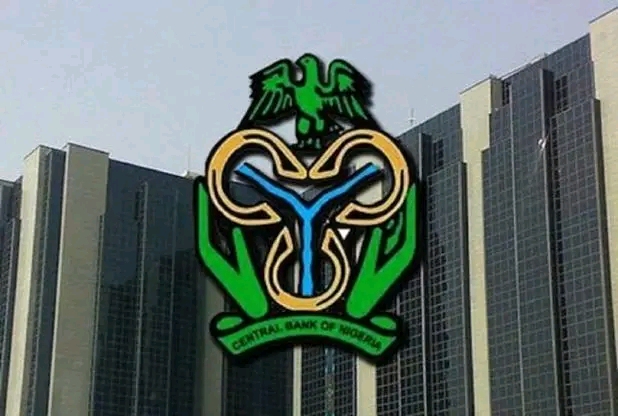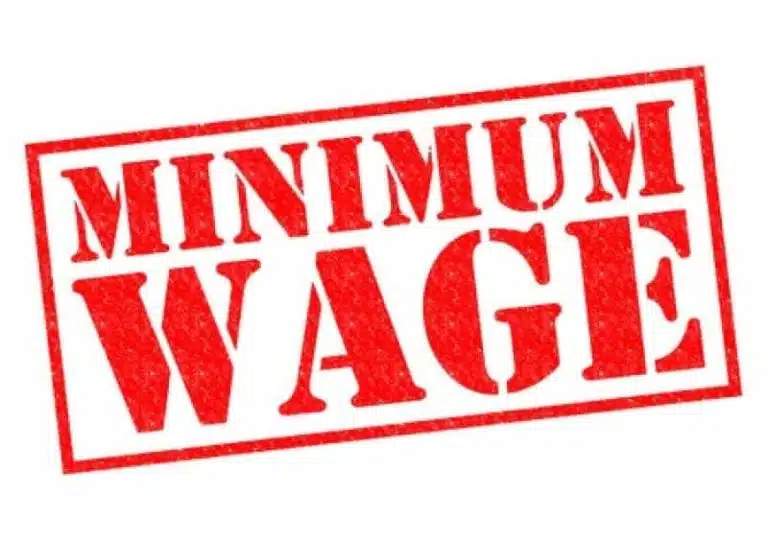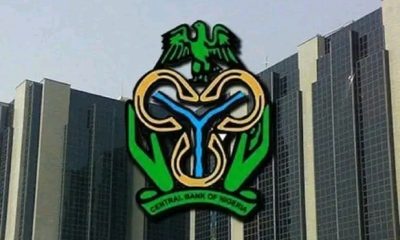Nigeria, Economy, CBN
CBN REVOKES HERITAGE BANK’S LICENCE
CBN REVOKES HERITAGE BANK’S LICENCE
By Tobouke JEMINE
The Apex Bank of Nigeria has revoked Heritage Bank Plc’s banking license. This action was taken against the dwindling financial performance of the bank and to avert total financial disaster.
The Acting Director of the Corporate Communication Department at the apex bank, Mr Sidi Ali ,said on Monday that inspite of various supervisory actions, the bank’s management has been unable to stop the financial decline of the bank.
According to the statement issued by the CBN, “We are committed to ensuring the safety and soundness of our financial system, and this action reflects that commitment.”
The Nigeria Deposit Insurance Corporation has been appointed as the liquidator for Heritage Bank, in accordance with the Banks and Other Financial Act 2020.
The statement reassured the public that the revocation of Heritage Bank’s license will not affect the overall health of the financial system.
The statement read, “The Central Bank of Nigeria (CBN), following its mandate to promote a sound financial system in Nigeria and exercise of its powers under Section 12 of the Banks and Other Financial Act (BOFIA) 2020, hereby revokes the licence of Heritage Bank Plc with immediate effect.
“This action has become necessary due to the bank’s breach of Section 12 (1) of BOFIA, 2020. The Board and Management of the bank have not been able to improve the bank’s financial performance, a situation which constitutes a threat to financial
stability.
“This follows a period during which the CBN engaged with the bank and prescribed various supervisory steps intended to stem the decline. Regrettably, the bank has continued to suffer and has no reasonable prospects of recovery, thereby making the revocation of the license the next necessary step.
“Consequently, the CBN has taken this action to strengthen public confidence in the banking system and ensure that the soundness of our financial system is not impaired.
“The Nigeria Deposit Insurance Corporation (NDIC) is hereby appointed as the liquidator of the bank under Section 12 (2) of BOFIA, 2020.
“We wish to assure the public that the Nigerian financial system remains on a solid footing. The action we are taking today reflects our continued commitment to take all necessary steps to ensure the safety and soundness of our financial system.”
Economy
CBN TO BANKS: Transfer Funds in Dormant Accounts/ Unclaimed Balances to Us

IduwiniVoice
By Tobouke JEMINE
The Central Bank of Nigeria (CBN) has directed all banks and other financial institutions to transfer funds in all dormant accounts to the apex bank.
A circular issued by CBN Ag. Director of Financial Policy and Regulations, Mr. John Onoja, yester night revealed that accounts that have remained untouched for 10 years and above would be affected.
It said, “The provisions of this guideline shall apply to all financial institutions under the purview of the Central Bank of Nigeria.”
According to the circular, the objectives of this move, among others, were to identify unclaimed balances in dormant accounts, and financial assets with a aim to reuniting them with their beneficial owners; keep the funds in trust for the beneficial owners; standardize the management of dormant accounts and unclaimed balances, and financial assets; establish a standard procedure for reclaiming warehoused funds.
It added, “Eligible accounts are dormant account balances that have remained with the FIs for a period of ten (10) years and beyond.
“Eligible dormant accounts/unclaimed balances and other financial assets shall include: current, savings, and term deposits in local currency; Domiciliary accounts; deposits towards the purchase of shares and mutual investments; and prepaid card accounts and wallets.
“Government Owned Accounts; Proceeds of uncleared and unpresented financial instruments belonging to customers or non-customers of FIs; Unclaimed salaries and wages, commissions, and bonuses; Proceeds of stale local and/or foreign currency drafts not presented for payment by beneficiaries; Funds received from a correspondent bank without sufficient details as to the rightful beneficiary and/or a recall of funds made to the remitting bank to which the Nigerian bank account had not been debited.
“A judgment debt for which the judgment creditor has not claimed the amount of judgment award; and any other deposits or financial assets that may be designated by CBN.”
According to the CBN, the following classes of dormant accounts/financial assets are exempted: Accounts that are subject of litigation; A judgment debt for which the judgment creditor has not claimed the amount of judgment award and the case is still active in court; Accounts under investigation by a regulatory authority or law enforcement agency; and encumbered accounts, including, but not limited to, collateral and loans.
© Source: 2024 Vanguard Media Limited, Nigeria
Foreign
AUSTRALIA/NIGERIA>Government Announces $915 Minimum Wage Effective From July 1st…

IduwiniVoice
AUSTRALIA/NIGERIA>Government Announces $915 Minimum Wage Effective From July 1st…
By Tobouke JEMINE
The recent announcement by Australia’s Fair Work Commission about a new minimum wage of $915.90 per week (or $24.10 per hour) effective from July 1, 2024, is a significant development for workers in Australia.
This 3.75% increase aims to help workers cope with inflation and economic shifts. It also improves Australia’s attractiveness for skilled international workers, given that meeting these wage standards is crucial for employers, especially those seeking to sponsor overseas employees.
In Nigeria the case is different. It’s been months Nigeria has not fixed its minimum wage challenges. The Nigeria Labour Congress (NLC) and Trade Union Congress (TUC) have proposed a substantial increase from N30,000 to N494,000, citing the high cost of living.
However, the federal government has not agreed to this demand, saying it is financially unsustainable. This institutional differences recently led to a nationwide strike, resulting in a temporary agreement to raise the minimum wage to over N60,000 while further negotiations take place.
Economy
High Interest on Loans Affect Economic Progress, says Dangote

IduwiniVoice
High Interest on Loans Affect Economic Progress, says Dangote
By Tobouke JEMINE
Yesterday, Aliko Dangote, President of Dangote Industries Limited, highlighted the negative impact of high interest rates on job creation and economic growth in Nigeria.
During his keynote address at the National Manufacturing Policy Summit organized by the Manufacturers Association of Nigeria (MAN) in Abuja, Dangote warned that the Central Bank of Nigeria’s 26.25% interest rate would cripple the manufacturing sector and hinder economic progress.
At the same summit, Vice President Kashim Shettima, chair of the National Economic Council (NEC), affirmed the Federal Government’s commitment to collaborating with MAN to develop a comprehensive roadmap and policy framework for the manufacturing sector.
In May, the CBN raise interest rate from 24.75 per cent to 26. 25 per cent.
Dangote said businesses cannot not cope with the current rate, adding: “Nobody can create jobs with an interest rate of 30%. No growth will happen.”
He also decried the penchant for importation of goods and services, saying it is a harbinger of poverty.
Dangote said: “Import dependence is equivalent to importing poverty and exporting jobs. No power, no growth, no prosperity. Similarly, no affordable financing, no growth, no prosperity. There is no industrialization without protection. Ignoring these facts is what gives rise to insecurity, banditry, kidnapping and abject poverty.”
He urged government to rethink its industrialization policy and provide necessary support and protection to the manufacturing sector, emphasizing that industrialization is key to sustainable economic growth and development.
Dangote highlighted the importance of manufacturing in driving economic diversification, job creation, and foreign exchange generation.
He said the manufacturing sector has declined over the years, resulting in significant import dependence and poverty.
Dangote cited examples of how Asian countries achieved industrialization by protecting and supporting local companies, attracting foreign investment, and creating competitive industries.
He maintained that government’s protection and support are crucial for the long-term survival and growth of industries, citing the success of Nigeria’s cement industry as an example.
Dangote stressed: “There are, no doubt, many causes for failure of our manufacturing sector to meet the expectations of our people. Let me use a personal example to illustrate.
“It is now an established fact that industrialisation is an inescapable route to sustainable and inclusive economic growth and human development.
Dangote Industries Ltd. confirms minor fire outbreak at its refinery
“I believe we all know the critical role that manufacturing plays in the modern economy, especially its impact on other sectors through various linkages; job creation; economic diversification & FX generation; government revenues; technology transfer/adaptation and Innovation.
“Manufacturing remains a key driver in a nation’s quest for economic development and self-sufficiency. It is easy to determine the level of economic development, growth, and wellbeing of a nation by observing its manufacturing sector.
“It is evident that the strength of a country’s manufacturing sector determines its capacity to compete in global trade of which 70% is in manufactured goods, according to available statistics.
“Countries that have industrilised and have a robust manufacturing sector and are able to export manufactured goods are generally able to grow their economies through global trade.”










